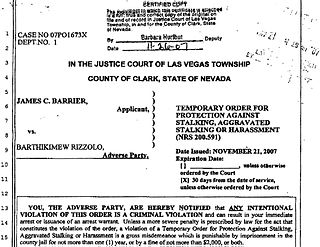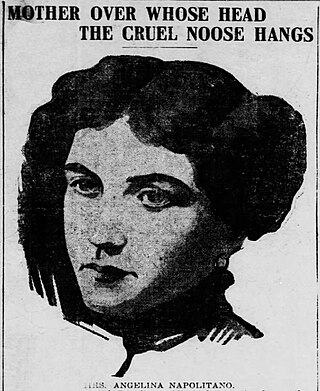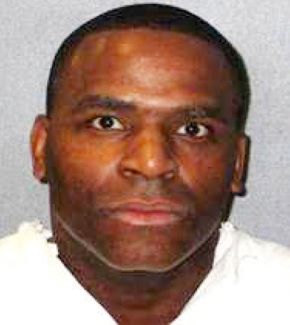The abuse defense is a criminal law defense in which the defendant argues that a prior history of abuse justifies violent retaliation. While the term most often refers to instances of child abuse or sexual assault, it also refers more generally to any attempt by the defense to use a syndrome or societal condition to deflect responsibility away from the defendant. Sometimes the concept is referred to as the abuse excuse, in particular by the critics of the idea that guilty people may use past victimization to diminish the responsibility for their crimes.
The urban survival syndrome, in United States jurisprudence, can be used either as a defense of justification or of excuse. The first case using, unsuccessfully, the defense of "urban survival syndrome" is the 1994 Fort Worth, Texas murder trial of Daimion Osby.

A restraining order or protective order, is an order used by a court to protect a person in a situation often involving alleged domestic violence, child abuse, assault, harassment, stalking, or sexual assault.
Battered woman syndrome (BWS) is a pattern of signs and symptoms displayed by a woman who has suffered persistent intimate partner violence—psychological, physical, or sexual—from her male partner. It is classified in the ICD-9 as battered person syndrome, but is not in the DSM-5. It may be diagnosed as a subcategory of post-traumatic stress disorder (PTSD). Victims may exhibit a range of behaviors, including self-isolation, suicidal thoughts, and substance abuse, and signs of physical injury or illness, such as bruises, broken bones, or chronic fatigue.
The Groveland Four were four African American men, Ernest Thomas, Charles Greenlee, Samuel Shepherd, and Walter Irvin. In July 1949, the four were accused of raping a white woman and severely beating her husband in Lake County, Florida. The oldest, Thomas, tried to elude capture and was killed that month. The others were put on trial. Shepard and Irvin received death sentences, and Greenlee was sentenced to life in prison. The events of the case led to serious questions about the arrests, allegedly coerced confessions and mistreatment, and the unusual sentencing following their convictions. Their incarceration was exacerbated by their systemic and unlawful treatment—including the death of Shepherd, and the near-fatal shooting of Irvin. Greenlee was paroled in 1962 and Irvin in 1968. All four were posthumously exonerated by the state of Florida in 2021.
Stacey Ann Lannert is an American woman convicted of the murder of her father, Tom Lannert, when she was 18 years old. She testified that he had sexually abused her since she was eight years old. Sentenced to life in prison without the possibility of parole, she served 18 years.
The Oklahoma Pardon and Parole Board is the parole board of the state of Oklahoma. The board was created by an amendment to the Oklahoma Constitution in 1944. The Board has the authority to empower the Governor of Oklahoma to grant pardons, paroles, and commutations to people convicted of offenses against the state of Oklahoma.

The Oklahoma District Attorneys Council is an agency of the state of Oklahoma that provides professional organization for the education, training and coordination of technical efforts of all Oklahoma state prosecutors and to maintain and improve prosecutor efficiency and effectiveness in enforcing the laws of the state. The Council distinguishes itself from the District Attorneys Association, a private organization, in order to lobby the legislature, though it is composed of the same members.

Angelina Napolitano was an immigrant to Canada who murdered her abusive husband in 1911, igniting a public debate about domestic violence and the death penalty. She was the first woman in Canada to use the battered woman defense on a murder charge and brought domestic abuse to national awareness.

In May 2012, 31-year-old Marissa Alexander was prosecuted for aggravated assault with a deadly weapon and received a mandatory minimum sentence of 20 years in prison. Alexander said that she fired a warning shot after her husband attacked her and threatened to kill her on August 1, 2010, in Jacksonville, Florida.

Cyntoia Brown Long is an American author and speaker who was convicted of robbing and murdering the person who bought her from sex trafficking. Brown, who was a victim of child sex trafficking at the time of the incident in 2004, claimed that Johnny Allen had paid her $150 to have sex with him, and that she feared for her life during their encounter, leading her to shoot him. Prosecutors argued that Brown killed Allen while he was sleeping. Brown was found guilty of robbing and murdering Allen and was sentenced to life imprisonment at 16.
Noura Hussein Hammad is a Sudanese woman who was sentenced to death by hanging on 10 May 2018 for killing her husband after he raped her. Hussein's legal team was given two weeks to appeal the sentence. In June 2018, Sudan commuted her sentence to five years in prison and a restitution payment of 337,000 Sudanese pounds.

Julie Daniels is an American politician who has served in the Oklahoma Senate from the 29th district since 2016.

Depp v News Group Newspapers Ltd[2020] EWHC 2911 (QB) was a defamation lawsuit brought in England. The case was initiated by American actor Johnny Depp, who sued News Group Newspapers (NGN) and then-executive editor Dan Wootton for libel after The Sun ran an article that claimed Depp had abused his ex-wife and criticised his casting in the Fantastic Beasts film series. The article stated, "Overwhelming evidence was filed to show Johnny Depp engaged in domestic violence against his wife Amber Heard," who "recounted a detailed history of domestic abuse incidents, some of which had led to her fearing for her life." After a three-week trial in London in July 2020, Andrew Nicol, a High Court judge sitting without a jury, rejected Depp's claim in a verdict announced later that year, ruling that the published material was "substantially true".

Toni Hasenbeck is an American politician who has served in the Oklahoma House of Representatives from the 65th district since 2018.
On 28 March 2020, 70-year-old Anthony Williams of Cwmbran, Wales, strangled his 67-year-old wife Ruth to death. The following February, he pleaded guilty to manslaughter on the ground of diminished responsibility, and was acquitted of murder. His defence argued that he acted due to his mental state, which had been worsened due to the COVID-19 pandemic. The lesser charge, and the sentence of five years' imprisonment, was criticised by politicians and anti-domestic abuse activists.
Melissa Elizabeth Lucio is the first woman of Hispanic descent to be sentenced to death in the U.S. state of Texas. She was convicted of capital murder after the death of her two-year-old daughter, Mariah, who was found to have scattered bruising in various stages of healing, as well as injuries to her head and contusions of the kidneys, lungs and spinal cord. Prosecutors said that Mariah's injuries were the result of physical abuse, while Lucio's attorneys say that her death was caused by a fall down the stairs two days prior.

Quintin Phillippe Jones was an American man from Livingston, Texas, who was executed for the 1999 killing of his great aunt, Berthena Bryant. Bryant's family and 183,344 other people petitioned Texas Governor Greg Abbott for clemency to commute his death sentence to a life sentence. He was executed on May 19, 2021, the first execution by the state of Texas in 10 months and only the second since the beginning of the COVID-19 pandemic in March 2020. He was executed without any media presence.

Julius Darius Jones is an American prisoner and former death row inmate from Oklahoma who was convicted of the July 1999 murder of Paul Howell. His case has received international attention due to claims of innocence and controversy surrounding his trial and conviction. Jones was convicted of the crime on the basis of what the Oklahoma Court of Criminal Appeals later characterized as an "overwhelming" body of evidence consisting of "a co-defendant who directly implicated Jones, eyewitness identification, incriminating statements made by Jones after the crime, flight from police, damning physical evidence hidden in Jones's parents' home, and an interlocking web of other physical and testimonial evidence consistent with the State's theory."
April Rose Wilkens is an American woman serving a life sentence at Mabel Bassett Correctional Center after her conviction for the murder of Terry Carlton and the subject of the podcast series Panic Button: The April Wilkens Case. She was one of the first women to use battered woman syndrome in an Oklahoma trial, and claimed to have acted in self defense, but it did not work in her favor and she was still found guilty by a jury. Local Tulsa news stations still to this day are hesitant to cover her case due to Carlton's family owning and operating dealerships which buy ad time from them. Her case caused an "outcry from those who say she acted because of battered woman syndrome." As of 2022, she was going into her 25th year of incarceration.









